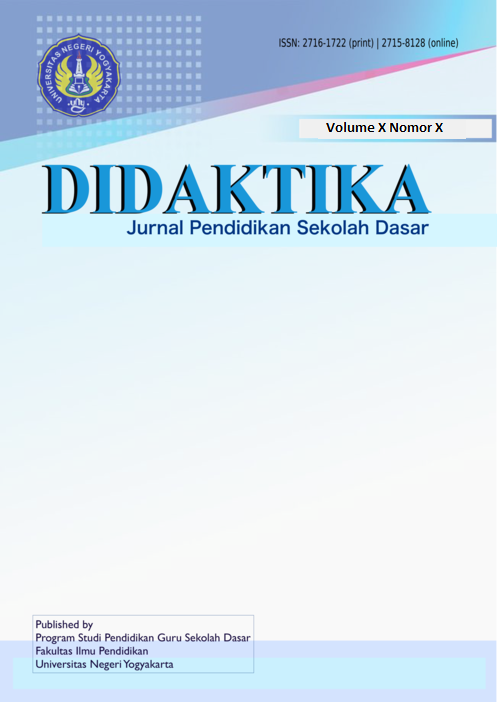Analysis of Critical Thinking and Self-regulation in Blended Method, Module-aided, Problem-Based Learning
DOI:
https://doi.org/10.21831/didaktika.v6i2.65540Abstract
References
Ali, S. S. (2019). Problem based learning: A student-centered approach. English Language Teaching, 12(5), 73–78.
Annisa, V., Fajrie, N., & Ahsin, M. N. (2021). Penerapan model problem based learning berbantuan media kartu gambar ilustrasi untuk meningkatkan pemahaman konsep siswa kelas IV sekolah dasar. WASIS: Jurnal Ilmiah Pendidikan, 2(1), 1–8.
Beach, P. (2017). Self-directed online learning: A theoretical model for understanding elementary teachers' online learning experiences. Teaching and Teacher Education, 61, 60–72.
Belland, B. R., Kim, C., & Hannafin, M. J. (2013). A framework for designing scaffolds that improve motivation and cognition. Educational Psychologist, 48(4), 243–270.
Bosica, J., Pyper, J. S., & MacGregor, S. (2021). Incorporating problem-based learning in a secondary school mathematics preservice teacher education course. Teaching and Teacher Education, 102, 103335.
Choo, S. S. Y., Rotgans, J. I., Yew, E. H. J., & Schmidt, H. G. (2011). Effect of worksheet scaffolds on student learning in problem-based learning. Advances in Health Sciences Education, 16, 517–528.
Delen, E., & Liew, J. (2016). The use of interactive environments to promote self-regulation in online learning: A literature review. European Journal of Contemporary Education, 15(1), 24–33.
Di Pietro, G., Biagi, F., Costa, P., Karpiński, Z., & Mazza, J. (2020). The likely impact of COVID-19 on education: Reflections based on the existing literature and recent international datasets (Vol. 30275). Publications Office of the European Union Luxembourg.
Ennis, R. H. (2015). Critical thinking: A streamlined conception. In The Palgrave handbook of critical thinking in higher education (pp. 31–47). Springer.
Faidati, N., & Sinuraya, S. I. (2021). Dampak Pandemi Covid-19: Studi Kasus Kemiskinan dan Ganggunan Kesehatan Mental di Kapanewon Seyegan, Sleman, DIY. Proceeding of The URECOL, 190–199.
Gupta, S., & Ahmad, I. (2018). The Strategies To Promote Critical Thinking in Learners. Researchers' Guild, 1(1), 8.
Holmes, N. G., Wieman, C. E., & Bonn, D. (2015). Teaching critical thinking. Proceedings of the National Academy of Sciences, 112(36), 11199–11204.
Kim, K.-J., & Kee, C. (2013). Evaluation of an e-PBL model to promote individual reasoning. Medical Teacher, 35(3), e978--e983.
Kizilcec, R. F., Pérez-Sanagust'in, M., & Maldonado, J. J. (2017). Self-regulated learning strategies predict learner behavior and goal attainment in Massive Open Online Courses. Computers & Education, 104, 18–33.
Lidia, R., Sarwi, S., & Nugroho, S. E. (2018). Pengaruh model pembelajaran problem based learning berbantuan modul terhadap kemampuan metakognitif siswa. UPEJ Unnes Physics Education Journal, 7(2), 104–111.
Mukminah, M., Wijaya, H., & Hirlan, H. (2021). Problematika Pembelajaran Saat Pandemi Covid-19 Di Madrasah Ibtidaiyah Nurul Ulum Mertak Tombok. JISIP (Jurnal Ilmu Sosial Dan Pendidikan), 5(1).
Natow, R. S. (2020). The use of triangulation in qualitative studies employing elite interviews. Qualitative Research, 20(2), 160–173.
Oxford, R. L. (2016). Teaching and researching language learning strategies: Self-regulation in context. Taylor & Francis.
Ransom, M., & Manning, M. (2013). Teaching strategies: Worksheets, worksheets, worksheets. Childhood Education, 89(3), 188–190.
Schunk, D. H., & DiBenedetto, M. K. (2020). Motivation and social cognitive theory. Contemporary Educational Psychology, 60, 101832.
Sherrington, T. (2020). Teacher-led instruction and student-centred learning are opposites. ResearchED Guide to Explicit & Direct Instruction: An Evidence-Informed Guide for Teachers, 73.
Thondhlana, G., & Belluigi, D. Z. (2017). Students' reception of peer assessment of group-work contributions: Problematics in terms of race and gender emerging from a South African case study.
Assessment & Evaluation in Higher Education, 42(7), 1118–1131.
Walker, A., Leary, H., & Hmelo-Silver, C. (2015). Essential readings in problem-based learning: Exploring and extending the legacy of Howard S. Barrows. Purdue University Press.
Widayanti, Y. (2020). Meningkatkan hasil belajar peserta didik dengan modul pembelajaran berbasis problem based learning (PBL). Jurnal Pendidikan Ekonomi Undiksha, 12(1), 166–174.
Wijnia, L. (2016). The problem with problems in problem-based learning: Difference between problem explaining versus problem solving. Health Professions Education, 2, 59–60.
Winarti, P. (2021). Analisis kesulitan belajar mahasiswa dalam perkuliahan konsep dasar IPA fisika secara daring di masa pandemi covid-19. Jurnal Komunikasi Pendidikan, 5(1), 93–107.
Zhou, J., Jiang, Y., & Yao, Y. (2015). The Investigation on Critical Thinking Ability in EFL Reading Class. English Language Teaching, 8(1), 83–94.
Downloads
Published
How to Cite
Issue
Section
Citation Check
License
- Authors retain copyright and grant the journal right of first publication with the work simultaneously licensed under a Creative Commons Attribution License that allows others to share the work with an acknowledgement of the work's authorship and initial publication in this journal.
- Authors are able to enter into separate, additional contractual arrangements for the non-exclusive distribution of the journal's published version of the work (e.g., post it to an institutional repository or publish it in a book), with an acknowledgement of its initial publication in this journal.
- Authors are permitted and encouraged to post their work online (e.g., in institutional repositories or on their website) prior to and during the submission process, as it can lead to productive exchanges, as well as earlier and greater citation of published work.






